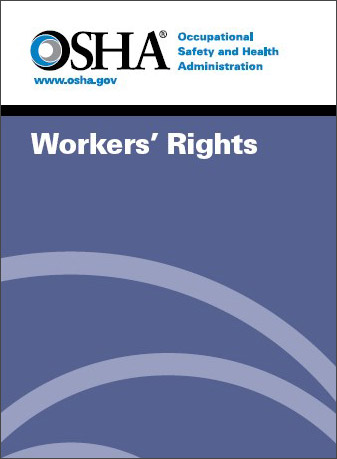Know Your Rights! Every worker has the right to a safe workplace under the OSH Act. Under federal law, you are entitled to a safe workplace. Your employer must provide a workplace free of known health and safety hazards. If you have concerns, you have the right to speak up about them without fear of retaliation.
 Image Source: Shutterstock
Image Source: Shutterstock - Know Your Rights! Under federal law, you are entitled to a safe workplace.
- Training provides details on OSHA, workplace hazards, workers’ legal rights, employer responsibilities, and how to file a complaint. Required by some states and companies in order to start employment.
- DOL Plastic Card Shipped Within 2 Weeks
- Reg. Price: 10hr: $89 - 30hr: $189
- Enter Promo Code "osha15off" at Checkout
Workplace Rights
You have the right under U.S. health and safety laws to:
- A workplace that is safe and free of recognized hazards
- Talk to your supervisor about unsafe or unhealthy working conditions
- File a complaint with OSHA about unsafe or unhealthy conditions
- Refuse to do a job task that you reasonably think might put you in immediate danger
- Know about the hazards in your workplace
- Not to be discriminated against (fired, given a worse job, etc.) for reporting safety hazards (“Whistleblower Protection”)
- Access to records of medical tests and tests that monitor your work environment for hazardous materials
- Access to information about injuries and illnesses that happen in your workplace
OSHA – Workers’ Rights Booklet
(OSHA 3021 – 2016) (English: PDF | Spanish: PDF)
 This booklet explains workers’ rights to:
This booklet explains workers’ rights to:
- File a confidential complaint with OSHA to have their workplace inspected.
- Receive information and training about hazards, methods to prevent harm, and the OSHA standards that apply to their workplace. The training must be done in a language and vocabulary workers can understand.
- Review records of work-related injuries and illnesses that occur in their workplace.
- Receive copies of the results from tests and monitoring done to find and measure hazards in the workplace.
- Get copies of their workplace medical records.
- Participate in an OSHA inspection and speak in private with the inspector.
- File a complaint with OSHA if they have been retaliated against by their employer as the result of requesting an inspection or using any of their other rights under the OSH Act.
- File a complaint if punished or retaliated against for acting as a “whistleblower” under the additional 21 federal statutes for which OSHA has jurisdiction.
Read more about your safety and health rights at work:
- Your OSHA Rights “In a Nutshell”
- When to Call OSHA: Calling OSHA isn’t the best action in every circumstance involving potential job hazards-this guide tells you when it makes sense to call for an OSHA inspection.
- How to File a Complaint with OSHA
- The OSHA Inspection: A Step-by-Step guide to how it works.
- Accident/Incident Investigation: Materials and tools to teach you to effectively investigate an incident
- What to do after an OSHA Inspection–how to ensure good follow-up and protect your rights.
- Using the General Duty Clause: The OSH Act states that the employer has a general duty to provide a safe and healthy workplace. Here’s a guide to using this clause to protect your health and safety in circumstances not covered specifically by OSHA standards.
- Protection from Retaliation:Protection for “Whistleblowers”
- OSHA Rights of Temporary and Contract Workers
- OSHA Rights and Laws relating to Young Workers
- Basic Worker Health & Safety Rights Under OSHA, NLRB and Other Agencies
